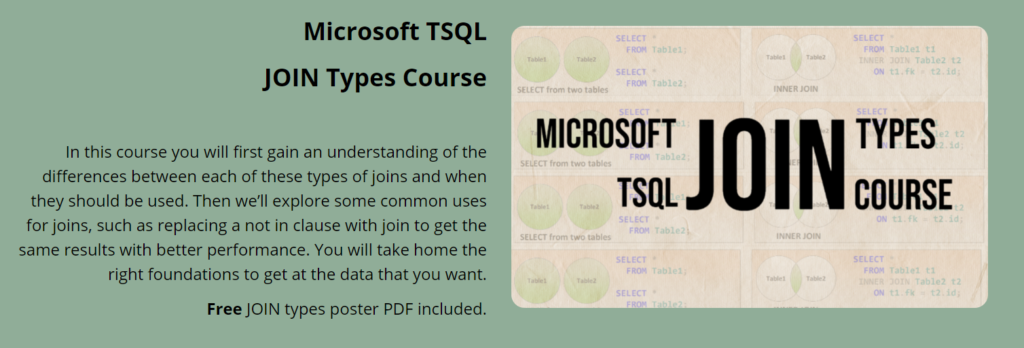Join Types Course

SQL Server is a powerful relational database management system used by businesses and organizations of all sizes. One of the most important operations in SQL Server is joining tables, which involves combining data from two or more tables based on a common column or set of columns. To help SQL Server users better understand the different join types and their uses, I have created a comprehensive course called “Join Fundamentals”.
The Join Fundamentals course covers all essential join types, including INNER JOIN, LEFT OUTER JOIN, RIGHT OUTER JOIN, and FULL OUTER JOIN. In addition, the course covers advanced topics such as joins with exclusion and subqueries. The course is designed for both beginners and experienced SQL Server users who want to improve their join skills and learn how to write more efficient queries.

The Join Types Fundamentals course provides a deep dive into SQL Server join types, including the syntax, examples, and best practices for each type. The course also covers how to optimize join performance and how to use join types effectively in real-world scenarios. The course is delivered in an interactive online format that includes video lessons, hands-on exercises, and quizzes to test your knowledge.
By taking the Join Fundamentals course, SQL Server users can gain a comprehensive understanding of join types and how to use them effectively. The course can help you improve your SQL Server skills and make you a more efficient and effective data analyst or database administrator.
Our Join Types course is a valuable resource for anyone who works with SQL Server and wants to improve their join skills. To learn more about the course and enroll, visit https://stevestedman.com/joins.
More from Stedman Solutions:

Steve and the team at Stedman Solutions are here for all your SQL Server needs.
Contact us today for your free 30 minute consultation..
We are ready to help!

Leave a Reply